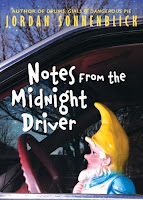The story of the girls of the Salem Witch Trials never fails to make a cold chill creep down my spine. The idea that mob mentality can decide life and death is a personal fear that I live with ... and yet these girls did it initially for attention, and subsequently because they were pressured by family and friends ... or so the version written by Hemphill alleges.
In this verse style account, each character tells their personal view of the happenings. From the first accusations, to the first arrests, to the first trials, to the first death ... you see the reactions and the decisions through the eyes of the girls.
For those of you unfamiliar with this story, the first person accused of witchcraft is a black maid. It seems that her "home remedies" of fortune telling and herbal concoctions are suspect enough to make the story viable. Of course, the girls involved want to shift blame away from themselves. They tell everyone that she is the one who made them do it, she is the evil one.
One witch accusation is enough to send the town into a tizzy of finger pointing and allegations. The girls involved are suddenly small town celebrities, children who want to bask in the attention. Another is accused, and another. The girls start to have fits, claiming the devil pinches them, the witches visit them in the night and hurt them. More girls suddenly fall sick to the witchcraft. Soon the whole town is caught up in the story.
To deny the accusation is impossible, for what proof is there outside of the girls' testimony? To stand up and ask for reason becomes taboo, as it calls into question the authority of the church (the leaders of which support these girls). From whispers behind closed doors, it soon becomes clear that the girls are not the only ones who stand to gain from this.
Hemphill weaves a dangerous tale of morality and mob mentality. Lies spiral out of control, and soon snowball. Each girl's tale holds a touch of reality and validity that makes the history behind the tale even more chilling.
*Library Link*
In this verse style account, each character tells their personal view of the happenings. From the first accusations, to the first arrests, to the first trials, to the first death ... you see the reactions and the decisions through the eyes of the girls.
For those of you unfamiliar with this story, the first person accused of witchcraft is a black maid. It seems that her "home remedies" of fortune telling and herbal concoctions are suspect enough to make the story viable. Of course, the girls involved want to shift blame away from themselves. They tell everyone that she is the one who made them do it, she is the evil one.
One witch accusation is enough to send the town into a tizzy of finger pointing and allegations. The girls involved are suddenly small town celebrities, children who want to bask in the attention. Another is accused, and another. The girls start to have fits, claiming the devil pinches them, the witches visit them in the night and hurt them. More girls suddenly fall sick to the witchcraft. Soon the whole town is caught up in the story.
To deny the accusation is impossible, for what proof is there outside of the girls' testimony? To stand up and ask for reason becomes taboo, as it calls into question the authority of the church (the leaders of which support these girls). From whispers behind closed doors, it soon becomes clear that the girls are not the only ones who stand to gain from this.
Hemphill weaves a dangerous tale of morality and mob mentality. Lies spiral out of control, and soon snowball. Each girl's tale holds a touch of reality and validity that makes the history behind the tale even more chilling.
*Library Link*
"The spirit reminds us all: do not forget what happened here," (Hemphill pg. 406, 2010).
If you liked this, check out:
Your Own, Sylvia by Stephanie Hemphill
A Break With Charity by Ann Rinaldi
The Crucible by Arthur Miller
Hemphill, Stephanie. (2010). Wicked Girls: A Novel of the Salem Witch Trials. New York: Balzer + Bray.
Your Own, Sylvia by Stephanie Hemphill
A Break With Charity by Ann Rinaldi
The Crucible by Arthur Miller
Hemphill, Stephanie. (2010). Wicked Girls: A Novel of the Salem Witch Trials. New York: Balzer + Bray.




